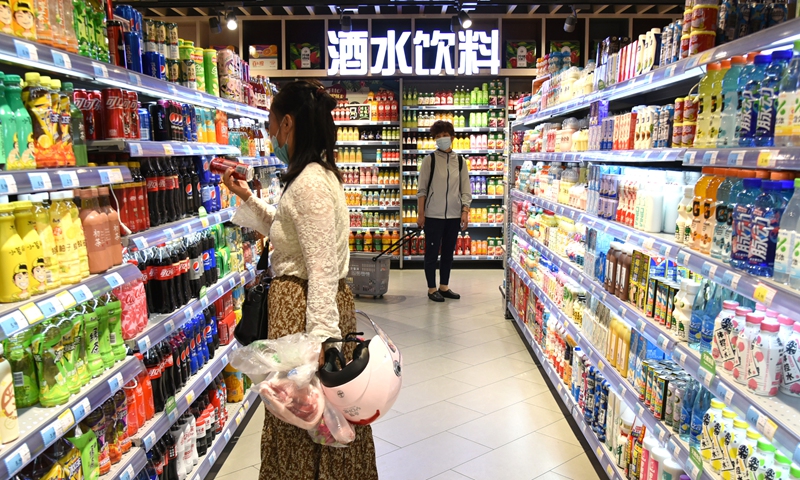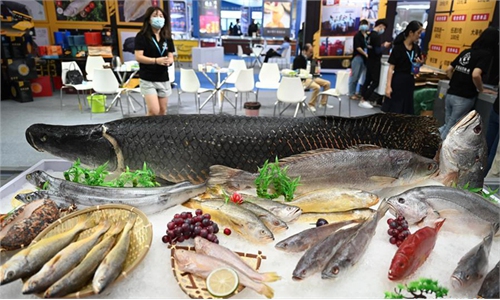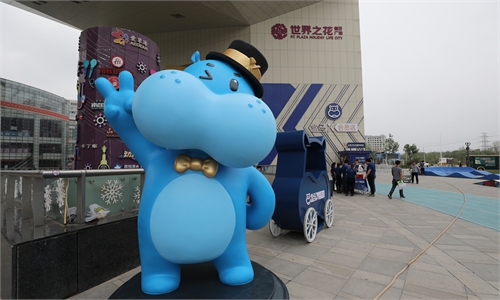
A consumer buys beverage at a supermarket in Lianyungang, East China's Jiangsu Province in June 2021. Photo: cnsphoto
It is possible to buy Beingmate milk powder products worth 888 yuan ($137.4) for only 7.5 yuan on Chinese e-commerce platforms. The only reason is that the products are near the end of their best-before date. The huge discount has sparked heated discussion on nearly-expired food - food that has nearly reached its sell-by date.
A discussion group named "I love near-expired food" went viral on Chinese social platforms, especially among the young, with people sharing experiences of buying near-expired food and information about where it is available.
The increase of production capacity also brings a huge inventory backlog to the market, making the near-expired food usher in a new development node. The subdivided market showcased the maturity of the industry, said analysts.
"The purchase of near-expired food, in fact, is a just-in-time type product, which could quickly appear or disappear with market changes at any time. Just because the Chinese market is big enough, any small demand can generate a huge capacity market, and therefore some industry suppliers can appear," said an independent economist surnamed Wang.
Huge market
In 2020, the total output value of China's snack food industry exceeded 3 trillion yuan. Even if calculated by 1 percent inventory, the market size of the near-expired food industry should be 30 billion yuan, with huge potential, read a report by iiMedia Research.
"Near-expired products can form a big market. But in the past, these products hid in the corner of the large supermarkets, and escaped the eyes of young people. Until 2020, affected by the COVID-19 epidemic, upstream stores are overstocked, and many sellers of interim commodities have seized this point to develop the near-expired food," Zhang Yi, CEO of consulting agency iiMedia Research, told the Global Times on Tuesday.
Among the near-expired food consumption groups, those aged 26-35 accounted for 47.8 percent. And over 60 percent of China's food purchases are made through e-commerce apps in 2020, per the report.
One of the key reasons behind the rise of the market for soon-to-expire food is the fast development of e-commerce and delivery industry. Compared to previous generations, younger people are more used to buy products using the delivery services, making it possible to receive the food before they expire, Zhang Xuefeng, an industry observer, told the Global Times on Tuesday.
Usage of delivery apps surged during the COVID-19, driving higher online sales of food and daily necessities. And more than 55 percent of Chinese consumers surveyed said they are likely to permanently buy more groceries online, according to the China Consumer Report 2021 published by McKinsey.
A director who is in charge of the food industry of an e-commerce firm, said that there are nearly 10,000 stores selling near-expired food on Taobao. In 2020, about more than 2 million users bought near-expired food, among which are mainly young people such as college students and those who were born in the 1990s.
Another reason, Zhang Xuefeng said, is the obvious lack of money for young people. "Young people nowadays are faced with immense pressure from limited wages and high living costs such as the rent."
New style of consumption characterized by "low price, de-branding, high-quality and basic functions" has become the trend among young people. A rising culture of being frugal, promoted by the government, is also encouraging younger people not to waste food, said analysts.
The integrated supply chain of near-expired food has been in a relatively mature stage of development, and also conforms to the law against food waste, which officially came into force on April 29, 2021, said analysts.
Complete supply chain
The upper reaches of the industry chain of near-expired food in China are suppliers like supermarkets. The middle reaches are sales channels, that are supermarkets, e-commerce and community apps for fresh food. And the downstream are individuals and enterprises, said observers.
"Large supermarket chains are the most suitable for the development of near-expired food sales business, because the supply chain management efficiency is high and can control the food risk. The public is easy to accept and buy at ease," a manager at a Shanghai-based B2B company that trade near-expired food, told the Global Times on Monday.
If there is no discount promotion, most supermarkets and convenience stores will return the products to the suppliers when they reach 40 percent of their shelf life.
For example, a food with a sell-by date of 100 days may be counted as near-expired when it has 60 days left before its expiry date. When supermarkets and convenience stores return goods, most suppliers need to return the same amount of money.
The manager added that supermarket chains to seniors are the same with e-commerce platforms to young people, as the latter are more willing to buy online, providing opportunities for online platforms to develop the near-expired food business.
As of June 2021, a total of 20 companies were registered for selling soon-to-expire food, up 82 percent year-on-year, according to data from public corporate platform.
But some analysts also warned the risks to enter the industry.
"Near-expired food is a niche market. Due to the time limitation and extremely short life cycle, large quantities of storage cannot be carried out even if the market demand is huge. Therefore, it is unlikely to evolve into a large-scale market. If enterprises cannot sell the food within the specified time, then the products will become negative equity, because disposing of the expired food is also a big expense," An Guangyong, an analyst at the China Mergers and Acquisitions Association, told the Global Times on Tuesday.



